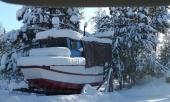Well, I went camping near the coast for Thanksgiving, and decided to give this a try.
The little cove near our campground was very dangerous, and if it weren't for my husband, I wouldn't have collected more than a few drops of water. I went down alone with plastic, gallon-sized, narrow-mouth bottles, and that was my first (really stupid) mistake. The narrow mouth made filling the bottles a very slow process.
Signage at the cove warned of rip currents, "sleeper waves," and to never turn your back on the water. Yikes. I tried collecting water from the shore for a minute or two, but then decided to climb over large rocks at the side of the cove, to see if I could find an area a little more protected from the waves. No luck. I got soaked. Totally defeated, and definitely fearing for my life if I continued, I gave up and headed back to camp.
Hearing my story, my husband decided to give it a try, and this time took the heavy, stainless-steel stockpots I'd brought for reducing the ocean water over the campfire, to collect the water in the first place. He managed to collect maybe 8 gallons. We put it over the fire, and had it boiling away for maybe 12 hours (I should have written this as soon as I got back, so that I remembered all the details better). This had it reduced to a slurry of about 4 cups. I stopped it there, and brought the rest home to finish the evaporation process in a low oven, for fear that I'd "burn" the salt over the campfire.
I'm ashamed to admit that after all that, I never got around to finishing the project (this is a bad personality trait I have). I did scrape some of the salt off the side of the pot to season the mashed potatoes that day for our camping Thanksgiving dinner, though! And, it tasted wonderfully salty and fresh on its own, not harsh or bitter.
The reason I've come back to post at all, is that I just watched episode 6 of
Tudor Monastery Farm, and the female host made salt during the episode. To "clean" the salt, she says they (Tudor people) would have added a protein, like bull's blood ("cheapest"), near the end of the evaporation process. She did not have bull's blood at hand, and so whisked up a dozen or so eggs to add. She said it made a difference. This made me think of the "raft" technique used to clarify stock for consommé. Lightly whipped egg whites, and lean ground meat are added to a strained stock, and as this cooks, it attracts and traps tiny particles in the solidifying mass. Then, the "raft" of cooked egg whites and meat is removed. So, the host of the Tudor Monastery Farm show wasted those yolks!

 2
2








 1
1









 2
2









 2
2




![Filename: 20180118_183700-640x480.jpg
Description: [Thumbnail for 20180118_183700-640x480.jpg]](/t/40112/a/57691/20180118_183700-640x480.jpg)

 2
2




 3
3




 1
1




 2
2











